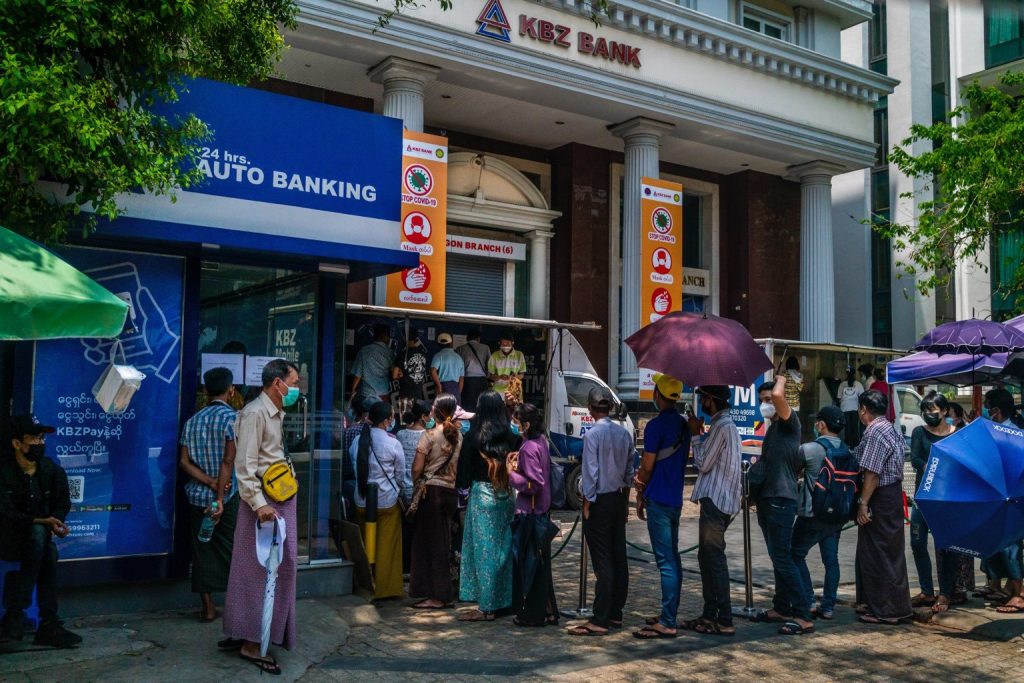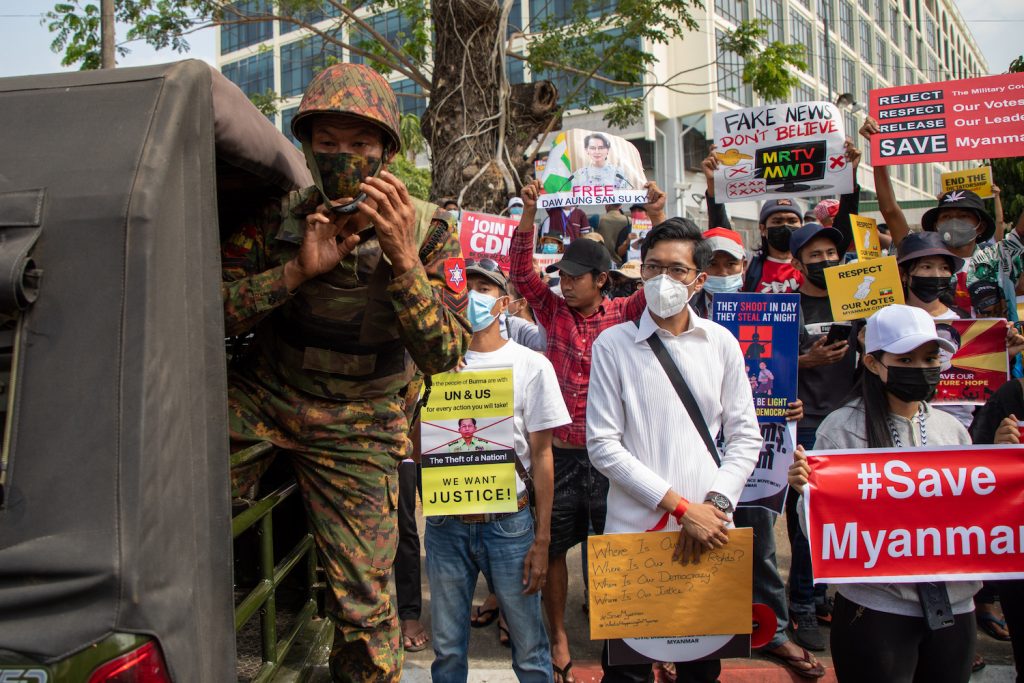Erratic economic decisions by the junta have created an inept foreign exchange system, which has been a boon for black market operators, but has left other sectors on the verge of collapse.
By FRONTIER
In 2018, Ma Sin Thi* started her business providing services to migrant workers using the illegal money transfer system known as hundi. In hundi transfers, workers pay an agent in one location, and the money is delivered by an agent elsewhere.
Workers in Thailand, Singapore and Malaysia sent their money to Sin Thi’s hundi contacts in those countries, then she paid the money out in Myanmar either in cash or into the KBZPay and Wave Money accounts used by the workers’ families, minus a small fee. She also provided currency exchange services, trading in the currencies of the three countries to and from the kyat, and also in US dollars, at black market rates.
Before the February 2021 coup, it was easy for Sin Thi to access her funds and make deposits into the workers’ accounts. Then a complication arose during the massive street protests in the weeks after the coup, when the Central Bank of Myanmar imposed limits on withdrawals from banks and ATMs.
In a letter to banks dated March 1, 2021, the CBM said the withdrawal limits were aimed at “facilitating the transition to a digital economy” by reducing cash use among government agencies and the public; in reality, it was more likely an attempt to stop a run on the banks, due to panicked citizens withdrawing their funds.
The withdrawal limits meant that Sin Thi had to stand in long queues to withdraw cash at banks, a task that became impossible when many banks temporarily closed.
Bank employees saw an opportunity to cash in on the inconvenience of queueing, and with the collusion of branch managers began offering to withdraw funds from customers’ accounts for a percentage of the withdrawal, typically between five and 10 percent.
The corruption saw increasing numbers of migrant workers opting to rely on hundi transfers, which in turn was a boon for Sin Thi’s black market business. With access to cash withdrawals severely restricted, she offered clients a cash withdrawal service, whereby they would transfer funds to her KBZPay or Wave Money account and Sin Thi would hand over cash, for a fee.
In April, Sin Thi’s business received another boost, courtesy of the junta’s erratic attempts at financial management.
The CBM fixed the rate of the kyat at 1,850 to the US dollar (updated in August to 2,100), and nearly all USD foreign currency accounts have since been converted to kyat at the official exchange rate. For Sin Thi, the new policies mean that business has boomed.
“After the foreign exchange policy was announced in April, my business has grown two-fold because of business customers,” Sin Thi told Frontier in August.
“Exporters who want to sell US dollars and importers who want to buy US dollars have all turned to the hundi market. I used to sell millions of kyat worth of US dollars, Singaporean dollars and Thai baht per month but now it has reached billions of kyat… The number of customers I used to have for money transfers and foreign exchange trading was about 150 a month, but it has grown to 300,” she said.
But trouble was around the corner. The sudden increase in the amount of money being transferred through Sin Thi’s Wave Money account resulted in it being closed in February this year by the company. “Then in June, one of my family members working on the Myanmar side was arrested,” she said.
The junta has cracked down on hundi and other money transfer services in an effort to limit money flowing to resistance groups. In Sin Thi’s case, her relative was charged with financing terrorism.
“When my family member was arrested, I offered a bribe of K30 million [US$14,000 at market rates] to have the case dropped. But I had to give up because he was charged under section 52(b) of the Counter-Terrorism Law,” she said.

Import nightmares
The junta’s attempts to control the foreign exchange market have also created a serious problem for importers.
“Importers have suffered because they need foreign currency exchange,” U Myo Gyi*, a commodities importer, told Frontier on August 22.
“The currency shortage was beginning to be felt in April. At first it was not very noticeable, but by June it was obvious,” he said.
Myanmar needs dollars to import products ranging from basic foodstuffs to technology and other manufactured goods. Imported fertiliser and farm chemicals, for example, are essential to maintain rice yields and maintain food security. However, the Foreign Exchange Securities Commission did not approve sufficient US dollar sales to importers to cover all required imports, including those on priority lists.
This has resulted in a situation where importers are having to buy US dollars from exporters or acquire them through hundi services.
“We buy US dollars at the market price, but because it is rising every day, we lose every time we sell,” said Myo Gyi. “We are being gradually worn down like a moth ball. If we don’t sell, our business will come to a stop. If we sell, we lose. The product we sell today we cannot buy at the same price to replace it on the shelf tomorrow. We are losing while we are selling. In this situation we are all suffering,” he said.
Businesses wanting to import products on the priority list – such as fuel, edible oil, pharmaceuticals and some building materials – have been told by the CBM that they must purchase US dollars at the fixed rate of K2,100, for which they need a letter of recommendation from the relevant business association. The recommendation is submitted to the FESC for approval, which is then used to apply for an import licence from the junta’s Ministry of Commerce. Then the import licence is presented to the CBM, which grants permission to a private bank to sell dollars to the importer.
“When you buy dollars for imports, you are required to pay the bank for them in kyat after three months and at the current fixed rate. The current rate is K2,100 but we can’t know what it will be in three months,” said a senior executive at a pharmaceutical import company.
“If you apply to import 13 kinds of medicine, you will be permitted to import only one. You may not receive approval to import the other 12 within the period in which the import licence is valid,” Myo Gyi added. Import licences are valid for just two months, which can be extended for one additional month.
Most importers who have spoken to Frontier since the policy was put in place have expressed being unable to obtain dollars at the CBM’s rate due to the junta’s reluctance to redistribute its foreign reserves. The combined bureaucratic hurdles for importing products have contributed to serious shortages of medicines.
In an attempt to alleviate shortages, the commerce ministry told pharmaceuticals importers on August 16 that if they could buy dollars on the informal market, they would be issued import licences.
Non-priority imports which do not make the list can only be bought using dollars acquired on the informal market, but merchants have reported difficulty obtaining sufficient dollars on the black market as well.
“The number of companies waiting for import licences has increased, making the situation more difficult,” said Myo Gyi. “The price of medicines imported with dollars bought on the black market will never be affordable for the general public,” he added.
Importers of products not included on the junta’s priority import list have also had to buy dollars through the hundi market, though in recent times that has become more difficult, said Ko Hein Htet*, who imports equipment for the power industry.
“Until April, when the foreign exchange policy started to change, we could import as we liked. Even though we had to rely 100pc on hundi services, we could easily buy tens of thousands or hundreds of thousands of dollars… Now we can’t. To get even $100,000, we have to buy in about 10 instalments. It’s been like this since July,” Hein Htet said.
The increased demand for hundi has meant that those providing the service have had to change the way they are doing business to avoid risking arrest. Sin Thi said that since July, most hundi service providers have been careful to provide dollars in small instalments.
“After one of my family members was arrested, instead of relying on one person to handle all my transfers in Myanmar, I have appointed several people to do the work. I dare not sell as many dollars as major buyers would like in one transaction, and only sell in instalments; the work previously done by one person is now done by 10 people, so labour costs have increased unnecessarily,” she said.
Power equipment importer Hein Htet said that dollar shortages had caused foreign trade partners to lose trust.
“Some businesses in Myanmar have relationships with exporters in China that were developed over many years, and they used to extend credit for between four to six months. But since early 2022, Chinese businesses no longer extended credit to any business in Myanmar,” he said.

New Central Bank rules, new tax systems
On August 16 the Central Bank, perhaps acknowledging the negative impact of its April ruling, announced that just 65pc of export income must be converted at its official rate directly after a transaction. The remaining 35pc can currently be retained for personal use, yet must be sold to…
Read More:‘We are losing while we are selling’: junta policies bite businesses
2022-09-19 04:50:42
